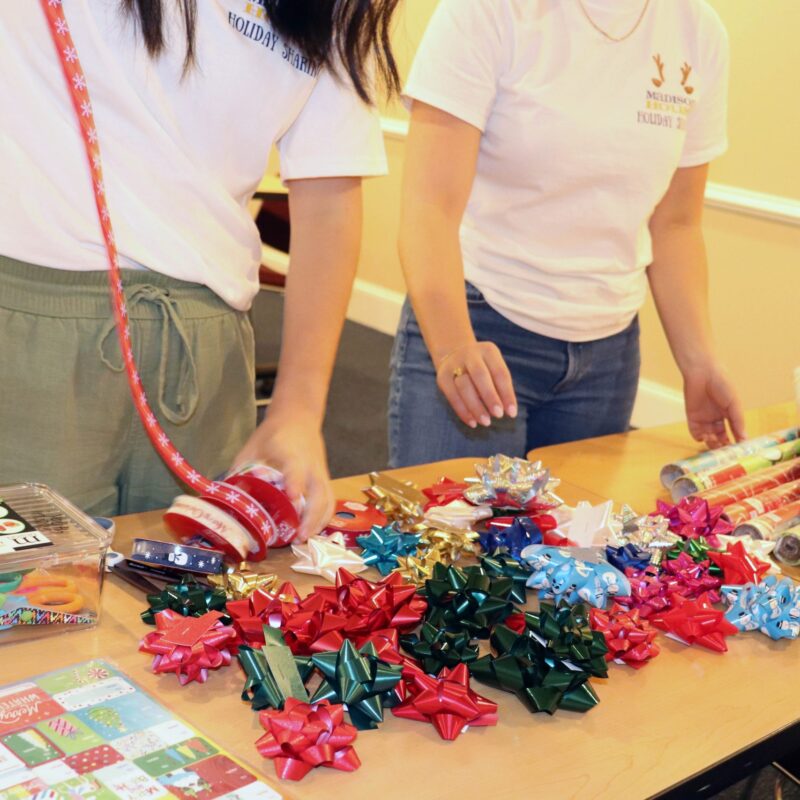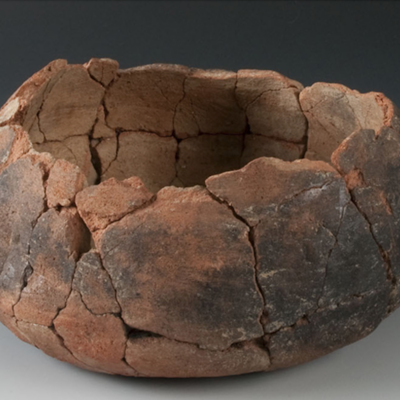Charlottesville and hip-hop have a troubled relationship; every time a scene gets going, something screws it up.
The problem can be traced back to 2001, when the now-shuttered Tokyo Rose ended its hip-hop shows because someone brandished a gun outside the sushi restaurant. The now infamous Outback Lodge also shut down its weekly “Underground Hip-Hop Night” after violence kept erupting, culminating in a shooting that took place in the club’s parking lot in 2007. The IS Venue saw violence the same year. And in 2010, Deuce’s Lounge, which opened in the building the Outback vacated and hosted regular hip-hop nights, closed its doors because of repeated fights.
|
Louis “Waterloo” Hampton, 31, has been rapping since he was 10 years old and credits hip-hop with giving him a voice. “I was very insecure as a kid; I didn’t know who I was or who I wanted to be, but hip-hop changed that. It let me know how to conduct myself and stand up for myself.” Hampton and Damani “Glitch” Harrison make up The Beetnix, Charlottesville’s premier hip-hop act. (Photo by Jackson Smith) |
Back then local rappers brushed it off, attributing the violence that seemed to follow hip-hop to happenstance. “[The violence] makes it look like hip-hop brings the bad crowd, but that’s not really the case,” Haans Slaughter, a rapper who performs under the name “H.B.,” told C-VILLE after the Outback shooting.
But two years have ticked by, and the people who live and breathe hip-hop are starting to feel choked, left without a stage from whence to spit their rhymes.
Louis “Waterloo” Hampton, now 31, has been rapping since he was 10 years old and credits rhyming with giving him a voice. He grew up without a father and it was the music that operated as his moral compass. “I was very insecure as a kid; I didn’t know who I was or who I wanted to be, but hip-hop changed that,” explained Hampton. “It let me know how to conduct myself and stand up for myself.”
Hampton, alongside Damani “Glitch” Harrison, is one half of The Beetnix, Charlottesville’s premier hip-hop act, and he believes the rap community shares the blame for the lack of regular venues.
“Whatever these cats are doing, when they’re bringing in this negativity, they’re messing it up for me and for a lot of artists who want to make it in this business,” said Hampton. “I’m not saying the brothers on stage are starting the trouble, but when it happens, they need to be the ones to tell people to stop it.”
Jeyon Falsini, the owner of Magnus Music and a booking agent, was one of the people who pushed for the Outback Lodge to showcase local hip-hop. He said the size of the town puts added pressure on local rappers to deliver a positive message and maintain a certain level of professionalism.
“It would be one thing if we were in a city that had enough venues so that the quality artists could be in one place and the knuckleheads could be in another,” said Falsini. “Then there would be so much going on that bad things can happen and it doesn’t destroy the overall scene. But in this small area, we don’t have that luxury.”
In other words, in a market this small, if the rapper doesn’t care, why should anyone else?
Falsini said The Beetnix have performed around Charlottesville with some success because they avoid those failings. “The Beetnix have never had anything happen at their shows, but promoters think that most hip-hop acts need to be regarded with a sidelong glance, like, ‘Are you going to fuck this up?’” The odds that another rapper does “f” things up have left The Beetnix with chances to display their talent few and far between.
During a Beetnix track titled “Cold Hearted,” Hampton raps, “It’s this heart of mine that’s broken/ now y’a’ll people still wanna provoke him/ gotta be joking/ I have worked way too hard to let you blur my focus/ I have had to cope with so many stresses/ put it in the back of my mind like “F” it/ ain’t worth the effort/ rather be resting/ but I gotta grind like I’m on my death bed/ with that being said/ it’s my destiny that’s progressing me.”
Heart, hard work, destiny. That’s the rap game. But you can’t play it without a stage.
In the spring of 2007, Falsini was enduring another night that seemed to prove that hip-hop would one day be doomed. A fight had broken out at the Outback Lodge between security and fans, and after it was over, Falsini was conversing with law enforcement agents about the situation. He was exhausted because the night had taken the stereotypical negative turn, but still he made his case: More hip-hop, not less, was the answer to the violence following the scene. It sounded crazy coming out his mouth, but Falsini believed it. What happened next shocked him.
“The cop agreed with me,” Falsini explained. “So you had a police officer agree that one hip-hop show is bad, but multiple would be safer because people put so much into this one time, when something—anything—goes wrong, they get incredibly upset.”
No stage, no show
This town lives and breathes music. Thomas Jefferson and James Monroe lived nearby, but ask most people about the area and they’ll cheerfully offer up, “You know Dave Matthews got his start here, right?” There’s also no shortage of venues in the town that Coran built: the Jefferson, the Southern, nTelos Wireless Pavilion, John Paul Jones Arena, the Paramount, and a host of smaller venues feature live music regularly.
Walk the streets on a weekend night and you’ll hear the guitars, the drums, and (unfortunately?) even the ukuleles, but the boom of the bass and the tightly wound lyrics spewed from the mic of a quality MC—those sounds have been stifled. For those Charlottesville music fans who love hip-hop and have come to depend on it to get them through life’s twists and turns, the silence is deafening. However, figuring out what happened and what needs to change involves following more twists and turns than Nas spun on Illmatic.
Ben Camp, a DJ and director of urban programming at WNRN 91.9, laments that local rappers haven’t given the city much to work with. He says there are plenty of MCs scattered around Charlottesville, but at times their message leaves something to be desired. That approach can doom any rapper’s chances, especially in a town where the mistakes of hip-hop’s past follow even the best-intentioned MCs, like a shadow that inevitably emerges when the sun shines the brightest.
“If someone takes their music seriously, then they’re gonna want to take pride in it,” explained Camp. “It’s also what they’re rapping about. If they’re rhyming about partying, having fun, that’s good. But if you’re up there rapping about guns and violence, it doesn’t bring about the best response from your audience. I learned that myself, from being a DJ. There are certain songs that just bring the wrong vibe back from people.”
|
William “Chaos Chytist” Rhodes, a 22-year-old local rapper and producer, is the self-proclaimed “biggest hip-hop artist in C’Ville.” Rhodes says local venues don’t want to give hip-hop a chance, “If we had the opportunity and venues would let us perform, we’d be able to do bigger things. But as soon as I say ‘hip-hop’ they shoot me straight down.” (Photo courtesy subject) |
That desire to educate and push through adversity is, in part, what rapping is about. Hip-hop is holding a megaphone up to the smallest voices; it allows the silenced to scream. “To quote KRS-One, ‘Hip is the knowledge, hop is the movement,’” explained Hampton. “Hip-hop inspires people like me to let others know about what’s going on in our lives and what’s going on in the world.”
This reporter tried to go straight to the source to see why local venues aren’t booking hip-hop acts.
Jason Pedone, the general manager of John Paul Jones Arena, claimed venues can only do so much because they rely on agents to bring in the acts, and while some performances have been successful (Jay-Z “blew it out” and B.o.B “did well”), “We don’t control the process.”
Casey Sparks, the director of marketing for Red Light Management, echoed that school of thought. Sparks said via e-mail that though they have brought Snoop Dogg, Wiz Khalifa, Immortal Technique and others to town, “Ultimately it is up to agents and managers of artists to want to play Charlottesville.” The requests don’t come in, so hip-hop doesn’t get featured. When I pressed Sparks that perhaps this means the company—which books both the Jefferson and nTelos Wireless Pavilion—should actively pursue a more diverse lineup, including local hip-hop artists, Sparks declined to comment further. Danny Shea—a man many credit with booking the best shows around town for Starr Hill Presents had this to say: “We want viable shows of all genres; I think we have a record that reflects this. For every show we have there are 10 to 20 shows we are trying to get that fall through. There are many variables that lead to wether an artist can confirm a date in Charlottesville or anywhere.”
But many local rappers say that creating a scene in Charlottesville is difficult because they don’t get the chances to play that rock bands get. It’s not them, it’s the city, they say.
William “Chaos Chytist” Rhodes, a 22-year-old local rapper and producer, explains that he encounters road blocks all the time. The self-proclaimed “biggest hip-hop artist in C’Ville” said venues don’t want to give hip-hop a chance. “If we had the opportunity and venues would let us perform, we’d be able to do bigger things,” he said. “But as soon as I say ‘hip-hop’ they shoot me straight down.”
Instead of beating his head against the wall, Rhodes goes online to promote his career. He constantly engages with his Twitter followers and Facebook fans and routinely sends his videos to well-known hip-hop blogs like worldstarhiphop.com in the hopes that they’ll take off.
Rhodes, understanding that violence and hip-hop seem to go hand in hand in Charlottesville, chooses a lighter tone. On tracks like “Hammered”—which has over 11,000 views on YouTube— Rhodes slings rhymes about, well, getting hammered. “I took a bottle to the head now it’s time to get this bread/ I be gone in another zone while y’all niggas just pretend” might not be the most inspirational message, but Rhodes is talking about having fun, not pistol whipping other crews.
Leaders of the new school
Way across town, the clouds that have gathered over Charlottesville’s hip-hop scene are casting their shadows over UVA’s campus. Michael Tobin, a UVA student and co-founder of the UVA Student Hip-Hop Organization (SHHO) chapter, said he decided to create a SHHO outpost on campus in 2010 when he noticed how negatively hip-hop is viewed around the school. SHHO—a Virginia-wide organization—exists to educate people about hip-hop culture, but it wasn’t easy doing that at UVA.
Tobin calls the University “white-washed” and “preppy,” and so when SHHO started, people basically said, “Get this trash out of here, we don’t want this around here,” he explained. While Tobin believes there has been progress, hip-hop is still seen as something to be feared or disregarded, not embraced, by most people.
“What people don’t understand is that there are a lot of good things that can emerge from hip-hop,” said Tobin. “I got a lot from hip-hop. I’m a lot more appreciative of different cultures. I’ve grown up around black, Asian, Spanish kids because of this music; because we have a common appreciation.” As for the connection between violence and rap? “I would argue that hip-hop keeps a lot of people out of gangs,” sayid Tobin.
|
Anthony Amos runs the bi-monthly “Verbs and Vibe Open Mic,” (formerly known as “Just Lyricz”) at Random Row Books on West Main Street. (Photo by John Robinson) |
Tobin speaks more truth than he probably realizes. There are countless tales of successful people that credit hip-hop with saving their lives. Jay-Z (Shawn Carter) is perhaps the most well known. He used to sell crack around his Brooklyn neighborhood until his mother bought him a boom box and he began to freestyle. The rest, as everyone knows, is history. Carter is now a mogul, raking in $37 million from May 2010 to May 2011 alone, according to Forbes.
The music changed Carter’s life on a big scale, but it’s changing Michael Bryant’s life more incrementally.
Bryant is a 15-year-old Charlottesville High School student. He’s had a rough life for such a young man. “I’ve been in a lot of trouble,” said Bryant. Sitting in a room in the Music Resource Center on Ridge Street, he speaks frankly. “I was hanging out with the wrong people.”
“There was a robbery,” he explained. “I was feeling a lot of stress, you know, doing this and that.” Bryant, who is now on probation from charges stemming from the robbery, says everything changed three months ago when his cousin suggested exploring hip-hop.
“That’s when I found a better way to express myself,” said Bryant. “I found a pen and some paper and just wrote down what I felt. Since then, I’ve just been writing.” In those three months, Bryant has turned his life around. He stopped hanging around with the crew that was connected to the wrong things and his schoolwork has improved.
Ty Cooper has lived and breathed the city’s hip-hop dilemma as an event promoter. He likens people’s resistance to it to the way rock was seen when it started to become big. It was The Beatles then, Lil’ Wayne now. Cooper is the man behind Another Sure Shot Entertainment, which brings diverse entertainment acts to Charlottesville and beyond. He also sits on the board of the Paramount. He’s trying to bring more hip-hop to town, but cites several obstacles.
“There are a lot of hip-hop artists here,” said Cooper. “There’s a scene here. But a lot of them do not do the due diligence that’s required to make it. They also don’t feel supported here in Charlottesville, and so a lot of times they end up just doing this as a hobby.”
That cycle ends up killing whatever momentum hip-hop ever gathers. A rapper grows up here never seeing another local rapper’s name in lights, and thinks that there is no chance for him. He doesn’t dedicate himself, and therefore venues don’t take him seriously. Venues are businesses—how can they be blamed for not giving MCs a shot when the rock scene is thriving? “You have to leave Charlottesville to get discovered,” admitted Cooper. “It’s not going to happen here. No one is coming here to find you.”
Cooper also claims that places like the Jefferson actually do control the kind of acts that play their venues, and they won’t listen to outside promoters, or at least those looking to book more hip-hop shows. He stopped short of calling what’s happening to hip-hop here racism, but said, “For the most part, there are a lot of individuals who are afraid of what they don’t know and understand.”
Flipping the script
Anthony Amos runs the bi-monthly “Verbs and Vibe Open Mic,” (formerly known as “Just Lyricz”) at Random Row Books on West Main. He says that rappers often show up to demonstrate their skills there and that since he started “Verbs and Vibe” over a year ago, there haven’t been any violent episodes. That’s likely, at least in part, because there is no alcohol served. But Amos says the nights are also successful because the show takes a new spin on something for which people around town haven’t shown much love. At one recent event, someone played a didgeridoo, another played a cello, and an MC rapped over top of it all.
Rappers, according to Amos, need to adjust their styles in order to get any publicity because most people in this city aren’t willing to forget the dark days of the music’s past. “Being that I’m older, a lot of people don’t think I know what I’m talking about,” said Amos. “But I try to tell rappers I’ve been around, and I’m not saying it’s right, but they have to understand where they are. Once they get something started, then they can try and maneuver [their performances].”
Amos agrees with Cooper about the existence of fear when it comes to hip-hop, and he spoke about it bluntly. “Charlottesville is definitely afraid of anything to do with black culture, especially hip-hop,” said Amos. In his opinion, the only way for things to change for the genre is for the “fear factor” involved to be openly talked about. This time, Amos said, the onus falls on the musicians. It’s the rappers—people who can twist words with the greatest of ease to make them convey intricate stories—that need to communicate better.
Black Star, a duo comprised of MCs Mos Def and Talib Kweli, released a self-titled album in 1998 that remains one of the most critically acclaimed hip-hop albums of all time. During “Respiration”—a subdued, yet realistic ode to life in the city—Kweli raps, “Some cats be MC’ing to illustrate what we be seeing/ Hard to be a spiritual being when shit is shakin’ what you believe in/ For trees to grow in Brooklyn, seeds need to be planted/ I’m asking if y’all feel me and the crowd left me stranded.”
Kweli is speaking about his home town and his own hip-hop journey, but the bars are also emblematic of what is happening here. It’s confusing and yet simple. It should work, but there are conversations that need to be had, memories that need to be forgotten, and approaches that need to be altered. If Charlottesville and hip-hop are ever going to find each other again, the stage needs to be booked, the MCs need to bring the rhymes, and the people need to keep the peace.
“I think there is hope [for hip-hop in Charlottesville],” said Amos. “I believe that there is nothing that is insurmountable. But like any good chess player will tell you, you have to alter your game to move ahead. There are people in places of decision making who will be willing to listen to the story of hip-hop, but you’ve got to get to them and teach them.”
/12020_work-02.jpg)
/photo-1.jpg)
/RI_-IMG_8321.jpg)





